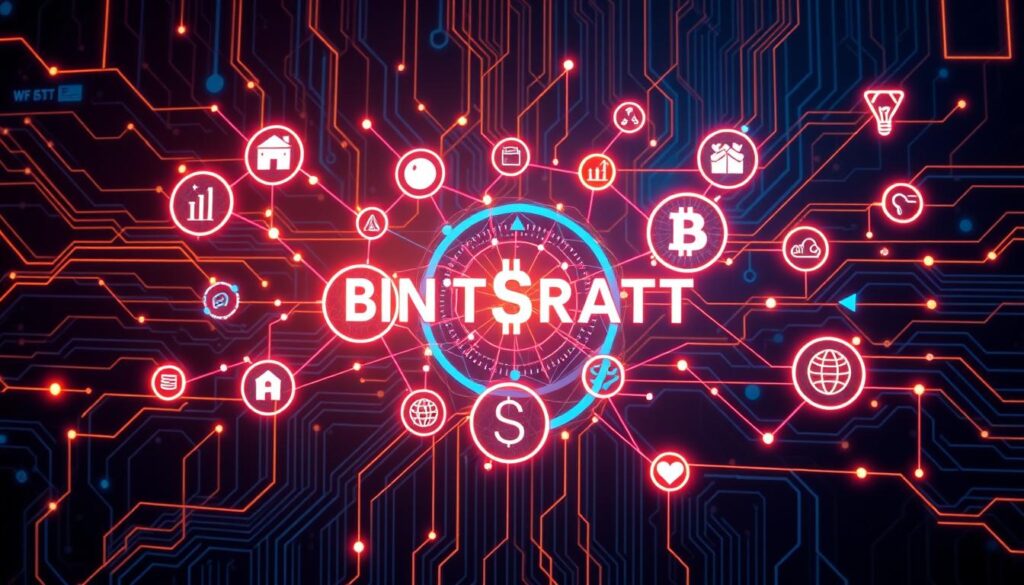Smart contracts have changed the game in blockchain technology. They make transactions automatic and agreements enforceable without middlemen. This tech brings more transparency and cuts down transaction times. Ethereum, launched in 2015, is a big player in this field, with over 200,000 developers.
The Ethereum Virtual Machine (EVM) is key to this system. It runs code in languages like Solidity. This ensures contracts execute automatically when certain conditions are met.
Smart contracts are used in many areas. They’re in DeFi apps, media & entertainment for royalty payments, and even in digital identity cards. Solana and Cardano are also making waves, with Solana handling 65,000 transactions per second and Cardano focusing on research.
Knowing the top smart contract development tools is vital. These tools help create strong, secure contracts. They automate complex tasks in the blockchain world.
Developers need to know the best tools to make the most of smart contracts. These tools help write, test, and secure contracts. As blockchain tech grows, it’s important to keep up with the latest tools and practices.
Introduction to Smart Contract Development Tools
The Scope of Smart Contracts goes beyond simple digital agreements. It automates complex financial tasks and makes transactions in Decentralized Applications (DApps) easier. Knowing the key tools for smart contract development is crucial for success in this new field. These tools include code editors, testing frameworks, and security audit solutions.

Compilers: Tools like Solidity compilers are key for turning high-level code into bytecode. This bytecode runs on the Ethereum Virtual Machine (EVM). Solidity, especially versions 0.4.16 or newer, is widely used for its compatibility and consistency.
Testing Frameworks: Platforms like Truffle, Hardhat, and Ganache offer a testing environment for smart contracts. They let developers test smart contracts in a simulated environment. This ensures the contracts’ logic is correct and secure.
Security Audit Tools: Since blockchain transactions are permanent, security is a top priority. Tools like MythX and ConsenSys Diligence help find vulnerabilities. They make sure smart contracts are reliable. The require function in Ethereum smart contracts is an example of how to improve security.
Knowing about these smart contract tools helps developers understand decentralized ledger technology better. It lets them use automated execution features. The variety and power of these tools are growing, offering better and more efficient solutions for the Scope of Smart Contracts.
Popular Smart Contract Development Tools
In the world of blockchain, Solidity is the top choice for making smart contracts on the Ethereum blockchain. It’s easy to use and works like JavaScript. Solidity also has features like inheritance and libraries for better code reuse.

Many Integrated Development Environments (IDEs) help in creating smart contracts. These include Remix IDE, Visual Studio Code, Atom, and IntelliJ IDEA. Each has its own benefits:
- Visual Studio Code: It’s fast and has a wide range of extensions.
- Atom: An open-source editor that’s customizable and great for teamwork with Teletype.
- IntelliJ IDEA: Made by JetBrains, it offers top-notch code help and refactoring tools. It works with many languages like Java, Kotlin, Groovy, and Scala.
For full development and testing, tools like Remix, Truffle, Hardhat, and Visual Studio Code are key. Testing tools like Ganache, Mocha, Waffle, and MythX are vital for smart contract reliability. Deployment tools like Metamask, Geth, and Parity make launching smart contracts easy.
| Tool | Purpose | Key Features |
|---|---|---|
| Solidity | Programming | Inheritance, Libraries, JavaScript-like Syntax |
| Visual Studio Code | Development Environment | Lightweight, Rich Extension Marketplace |
| Atom | Text Editor | Open-source, Customizable, Teletype for Collaboration |
| IntelliJ IDEA | Development Environment | Advanced Code Assistance, Robust Refactoring Tools |
| Remix IDE | Development Environment | Browser-based, Easy to Use |
| Hardhat | Development Environment | Testing, Debugging, Deployment |
| Truffle | Development Framework | Testing, Compilation, Deployment |
| Ganache | Testing | Personal Blockchain, Testing Suite |
| Metamask | Deployment | Browser Extension, Wallet, Deployment |
These tools make blockchain app development more efficient and secure. They help a growing community of developers work on smart contracts.
Learn Smart Contracts Technology
Smart contracts are digital agreements on a blockchain that run automatically when certain conditions are met. They use the Ethereum Virtual Machine (EVM) to work well in decentralized apps (DApps). This means no middlemen, quick results, more trust, and less cost.
Understanding the EVM is key to smart contracts. Launched in 2015, Ethereum is a top platform for these contracts. It makes sure code runs safely, away from the main blockchain. This is vital for DApps in finance, supply chain, and healthcare.
- Smart contracts are fast and accurate, automating agreements.
- Real-world examples like IBM Blockchain Transparent Supply and we.trade show their value.
- They use cryptography to keep data safe and secure.
Smart contracts work on “if/when…then…” rules, written in blockchain code. They are trusted and transparent, important for industries using blockchain. For example, The Home Depot uses them to solve disputes with vendors, making supply chains clearer and improving relationships.
To use smart contracts in DApps, you write, test, deploy, and invoke them. Platforms like IBM Blockchain Transparent Supply and Pharma Portal have shown how they improve supply chains. This makes things more transparent and efficient.
Besides Ethereum’s EVM, there are other options. Binance Smart Chain, launched in 2020, has lower fees and quicker transactions. Cardano and Polkadot focus on scalability and working with different blockchains. Solana is known for its fast transactions, supporting smart contracts and DApps.
Here’s a look at different blockchain platforms for smart contracts:
| Platform | Launch Year | Key Features |
|---|---|---|
| Ethereum | 2015 | Leading platform for smart contracts, robust ecosystem. |
| Binance Smart Chain | 2020 | Lower fees, faster transaction times. |
| Cardano | 2017 | Scalability and sustainability for smart contracts. |
| Polkadot | 2020 | Interoperability among blockchains. |
| Solana | 2020 | Fast transaction speeds, low fees. |
| Stellar and Soroban | 2022 | Open-source smart contracts platform. |
By understanding utilizing Ethereum Virtual Machine (EVM) and similar tech, developers and businesses can tap into smart contracts. This will help blockchain technology grow in many industries.
Security and Testing of Smart Contracts
In the fast-changing world of blockchain, keeping smart contracts safe is key. In Q3 of 2023, the crypto world lost $720 million, mostly due to smart contract flaws. Reentrancy attacks caused $85 million in losses, and flash loan attacks added $5.8 million.
Smart Contract Auditing is vital for blockchain security. Developers use strict coding, careful deployment, and constant updates to fight smart contract vulnerabilities. This mix is essential to protect against attacks.
Designing smart contracts with care is crucial. Simple and modular designs help avoid bugs and make it easier for everyone to understand. Also, keeping gas costs low prevents errors that could stop a contract from working.
Testing is also key. Aim for 100% code coverage to catch and fix issues before they cause problems. Tools like Solidity Coverage plugin and SuMo help check how well tests work and find weak spots.
Threats like reentrancy attacks and phishing need to be stopped. Regular Smart Contract Auditing finds and fixes weaknesses. Using security tools and design patterns like the Factory Pattern helps make contracts safer.
- Rigorous coding practices.
- Comprehensive testing using specialized libraries like OpenZeppelin Test Helpers.
- Vigilant deployment strategies to prevent external threats.
- Ongoing monitoring and updates to maintain security post-deployment.
| Security Measure | Benefit |
|---|---|
| Smart Contract Auditing | Identifies potential security loopholes |
| Rigorous Coding Practices | Prevents coding errors such as syntax and logical mistakes |
| Comprehensive Testing | Ensures robust performance and mitigates risks of bugs |
| Ongoing Monitoring | Enables quick detection and response to threats |
By using these methods, developers can make smart contracts more secure and reliable. This builds trust and stability in the blockchain world.
Conclusion
Smart contracts, first thought of by Nick Szabo in 1994, have grown a lot. They are changing many fields like real estate and healthcare. They make things more efficient and secure by automating actions without needing a middleman.
From Szabo’s ideas to real use in trading, smart contracts are key to blockchain’s future. They use programming languages like Solidity and run on platforms like Ethereum. This makes sure money moves right when it should and penalizes if it doesn’t.
As smart contracts get better, picking the right tools is more important. We must focus on making them secure and reliable. This means fixing mistakes before they cause problems.
Smart contracts are leading to a future where digital agreements are fast, safe, and cheap. With new tools, developers can make the most of smart contracts. This will change how we do business on the blockchain.

